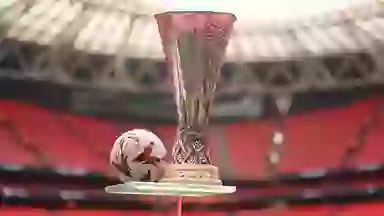UEFA have strict rule Man Utd and Spurs MUST follow no matter who wins the Europa League

UEFA’s Strict Rules Await Manchester United or Spurs if They Triumph in the Europa League Final
As Manchester United and Tottenham Hotspur prepare for an all-English showdown in the Europa League final, both clubs must be aware of strict UEFA regulations regarding the competition’s iconic trophy—should they emerge victorious.
Despite enduring difficult domestic seasons that see them languishing in 16th and 17th place respectively in the Premier League table, both sides have managed to find solace in European competition. They now stand just one game away from claiming continental silverware and securing an invaluable spot in next season’s UEFA Champions League. The high-stakes final is set to take place on Wednesday night at the San Mamés Stadium in Bilbao, where European glory—and a significant financial windfall—awaits the winner.
For Manchester United, this is an opportunity to recapture the success they experienced in 2017 under then-manager José Mourinho, when they lifted the same trophy after defeating Ajax. On the other hand, Tottenham Hotspur are eager to end a long and painful trophy drought, with their last major piece of silverware dating all the way back to their League Cup win in 2008.
However, lifting the Europa League trophy comes with more than just bragging rights and financial rewards. UEFA, the governing body of European football, enforces strict guidelines that both clubs must adhere to if they win.
Trophy Regulations: More Than Just a Symbol of Victory
The UEFA Europa League trophy is the heaviest of all UEFA trophies, weighing in at an impressive 15 kilograms. Despite the triumphant team hoisting the original trophy during the presentation ceremony at San Mamés, the actual prize remains the property of UEFA and never permanently changes hands.
Instead, UEFA will award the champions a full-size replica of the original trophy, along with 50 gold medals to distribute among players and staff. Yet even the replica comes with significant strings attached.
According to UEFA regulations, the replica trophy must remain under the club’s control at all times and cannot leave the borders of the winning team’s country without obtaining prior written approval from UEFA. This rule ensures the integrity and brand image of UEFA competitions is maintained across all promotional and celebratory activities.
UEFA’s official guidelines state:
“Replica trophies awarded to winners of the competition (past and current) must remain within the relevant club’s control at all times and may not leave the club’s country without UEFA’s prior written consent. In this respect, clubs must comply with any request from the UEFA administration to confirm the location of the club’s replica trophies.”
Furthermore, clubs are forbidden from using the replica in any setting where third-party sponsors or commercial partners might gain exposure or appear to be affiliated with the trophy or the competition itself. This means that Manchester United or Spurs cannot display the trophy at events, campaigns, or marketing ventures that feature sponsor branding—unless UEFA explicitly approves such usage.
The Financial Stakes: Up to £54 Million on the Line
While the trophy may be symbolic, the financial rewards of winning the Europa League are anything but. Manchester United and Tottenham are each reported to have already earned approximately £26 million for their performances in the group stage and progression to the final. However, victory on Wednesday night would unlock even greater riches.
According to a BBC report, the Europa League winners stand to gain up to £54 million in total. This includes £21 million in guaranteed prize money, although only £5 million of that amount is specifically for winning the final itself. The bulk of the potential earnings comes from the golden ticket that is Champions League qualification—an outcome that brings increased broadcasting revenue, higher matchday earnings, and the prestige of participating in Europe’s elite competition.
In total, England could see six teams participating in the Champions League next season if the winner of the Europa League comes from outside the top four—a rare and lucrative scenario for English football.
As United and Spurs prepare to clash in Bilbao, the dream of glory, the weight of the trophy, and the promise of financial prosperity hang in the balance. But with UEFA’s regulations in place, the path from lifting the trophy to showcasing it around the world is far more complicated than it seems.